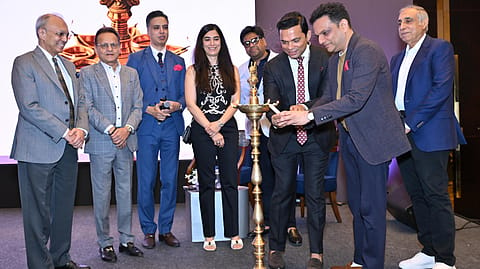How Neo Wealth is plotting its way to a ₹1 lakh crore valuation
With a focus on trust, talent, and long-term alignment, the new age wealth firm is quietly building a scaled, full-stack wealth and alternatives space platform.

It was an almost ceremonial handover on a quiet Saturday evening at the Conrad Hotel in Bengaluru. On a stage lit by the glow of ceremonial lamps—and some noteworthy high-net-worth clients and well-wishers—Neo Wealth & Asset Management’s co-founder and outgoing CEO Varun Bajpai “passed the baton” to Shajikumar Devakar, who had moved over from 360 One WAM to join Neo as its new co-founder and CEO.
With the air of a founder who still remembers filling out the company’s incorporation forms just three years ago, Bajpai made no attempt to downplay the audacity of the firm’s ambitions. “Three years ago, we were literally at zero,” he recalled. Nitin Jain, who played a key role in Edelweiss Group’s growth into a diversified financial services firm managing over $40 billion in client assets, founded Neo Wealth & Asset Management in October 2021.
Today, Neo claims to have ₹40,000 crore across platforms, ₹11,500 crore in asset management alone, and ₹2,000 crore in net equity, with all the capital we raised still sitting as cash. In 2024, Neo saw its last capital raise of ₹400 crore ($48 million) in a Series B round led by MUFG Bank and New York-based Euclidean Capital. “The entire equity we’ve raised still sits as cash. We haven’t burnt a rupee. We are building for long-term profitability, not just for optics,” said Bajpai.
Neo now wants to be counted among India’s most valuable wealth management players —with a valuation of ₹1 lakh crore, or $12 billion.
Culture vs Growth
Neo’s founders want to build the company on contrarian foundations—deep investing knowledge over salesmanship, cultural alignment over scale-at-any-cost hiring, and long-term trust over quarterly revenue targets. That approach entails chasing the right talent. “We think the top 15–20% of bankers in the country are fabulous,” Bajpai said. “That’s who we are going after. Not hundreds of bankers. Just the best.”
Devakar, a 23-year veteran of private banking, said his decision to join Neo was guided by instinct, aspiration, and culture. “This is my last dance,” he said. “So, it had to be with a set of founders I respect, a platform that is already built out, and a vision I can make my own.”
Recommended Stories
For Kumar, Neo’s full-stack capabilities—across asset management, trust structuring, insurance broking, and legacy planning—were a rare find in an industry still dominated by product-pushing and fragmented offerings.
But it was the clarity of purpose that sealed the decision.
“Neo’s tagline is simple: do good to all stakeholders. And it’s not just about the client. It’s internal, too—everyone you touch.”
(INR CR)
Aspiring Blackstone
While Neo’s roots lie in wealth management, its parallel bet on becoming India’s most formidable player in alternative asset management has been just as audacious—and arguably, equally impressive.
As Hemant Daga, CEO of Neo Asset Management, put it, “We want to deliver to the world India’s own Blackstone…exceptional returns with peaceful nights.”
Daga’s playbook for the asset management vertical leans heavily into private markets—a theme resonant with the world’s most successful allocators. He cited examples of Canadian pension funds and global infrastructure players, all of whom allocate 60% or more of their portfolios to private markets, generating robust and stable returns. “If the world’s largest are doing it on this AUM, delivering great returns, then there’s something happening there for sure,” he pointed out.
In just three years, Neo Asset Management has built a platform spanning private credit, real assets, and private equity. Last year alone, the firm deployed ₹4,000 crore. This year, it plans to cross a billion-dollar deployment threshold. It has evaluated over ₹1 lakh crore in private market deal flow over two years. “We own roads and solar plants today,” Daga noted, adding, “Tomorrow, we want to own airports, transmission lines, and cash-generating assets across India.”
The firm’s private credit arm is tapping into a structural shift as Indian corporates look beyond banks for funding—a theme reminiscent of where the U.S. was in the early 1990s, when the likes of Oaktree and Blackstone were born.
Most notably, Daga emphasised Neo’s risk philosophy. “We don’t take binary bets. No long-tail risks. Our clients and we deserve peaceful nights.” The model, he said, is rooted in delivering stable, consistent returns, supported by institutional talent from KKR and the likes.
Chasing growth vs return
Neo wants to move beyond the “proof-of-concept” stage to building institutional “permanence”. The target? Join India’s elite ₹1 lakh crore valuation club—a cohort that includes only 92 companies, which was brought forth by Neo’s event guest speaker and investor-industrialist, Gaurav Dalmia of Dalmia Group Holdings.
Dalmia went on to deliver a masterclass in investing in what makes companies achieve that elusive valuation: high return on equity, reinvestment discipline, depth in talent, and staying paranoid about innovation. “Only in India can a firm built in 25 years surpass Goldman Sachs. That’s the India premium. And that’s the opportunity before Neo,” said Dalmia.
On chasing growth versus return on equity tradeoff, Dalmia illustrated with the example of HDFC Bank, which didn’t always have the highest ROE, but delivered very high growth consistently, resulting in massive wealth creation and market cap expansion. His message to Neo and others was clear: don’t obsess over short-term ROE if long-term growth is scalable and value accretive.
A recent report by Deloitte estimates a S$1.6 trillion AUM growth opportunity for wealth management service providers between FY24 and FY29. Not surprisingly, Neo’s roadmap to ₹1 lakh crore hinges on executing its vision of specialised wealth capabilities, global benchmarking, tech-led scalability, and building trust. As Devakar put it aptly. “We want to manage risk, not just return. The platform is built. Now it’s time to roll up our sleeves.”